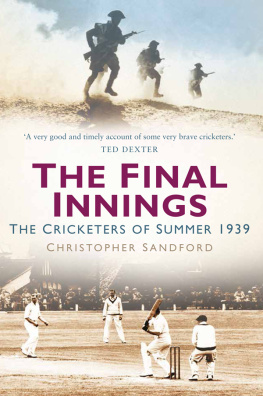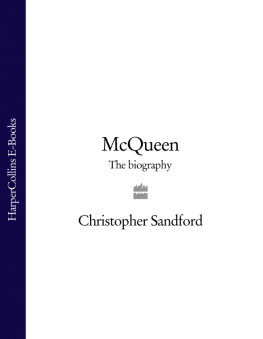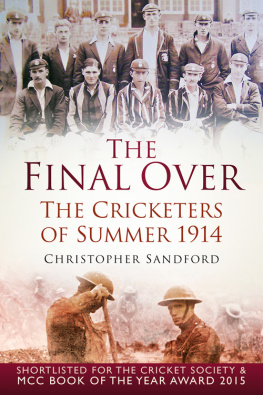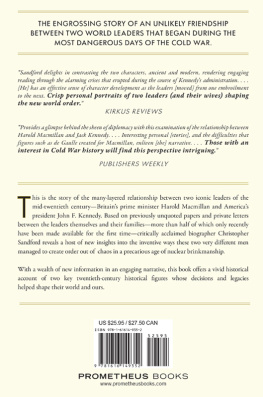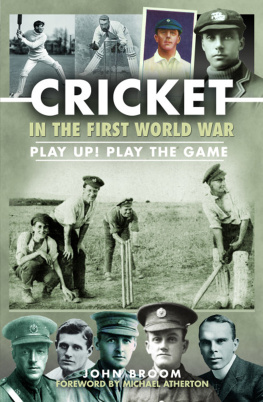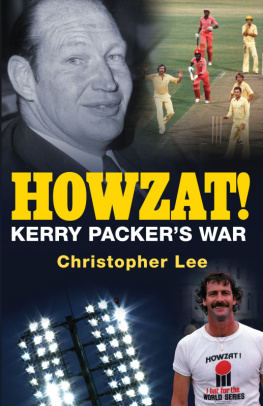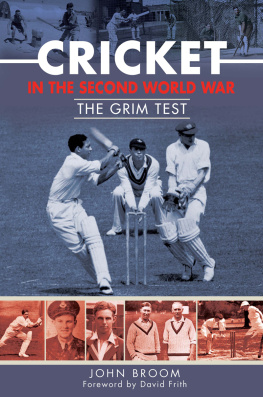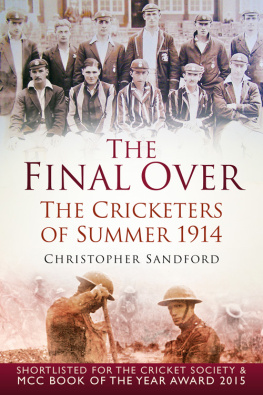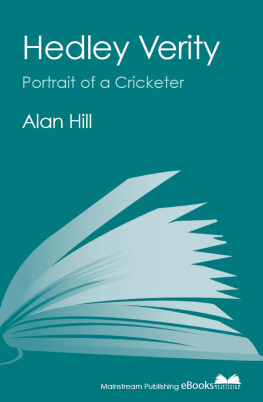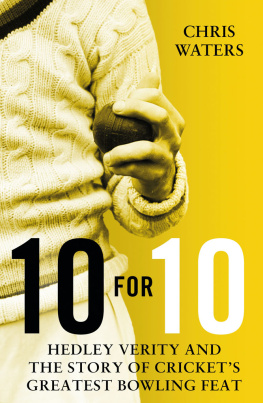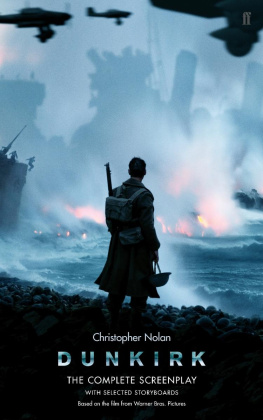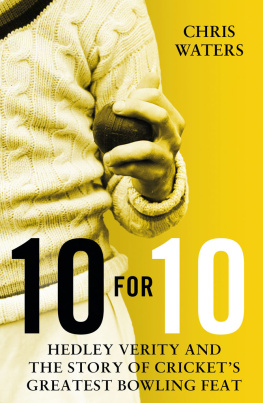The right of Christopher Sandford to be identified as the Author of this work has been asserted in accordance with the Copyright, Designs and Patents Act 1988.
All rights reserved. No part of this book may be reprinted or reproduced or utilised in any form or by any electronic, mechanical or other means, now known or hereafter invented, including photocopying and recording, or in any information storage or retrieval system, without the permission in writing from the Publishers.
British Library Cataloguing in Publication Data.
A catalogue record for this book is available from the British Library.
Also by Christopher Sandford
FICTION
Feasting with Panthers
Arcadian
We Dont Do Dogs
PLAYS
Comrades
MUSIC BIOGRAPHIES
Mick Jagger
Eric Clapton
Kurt Cobain
David Bowie
Sting
Bruce Springsteen
Keith Richards
Paul McCartney
The Rolling Stones
FILM BIOGRAPHIES
Steve McQueen
Roman Polanski
SPORT
The Cornhill Centenary Test
Godfrey Evans
Tom Graveney
Imran Khan
John Murray
HISTORY
Houdini and Doyle
The Final Over
Macmillan and Kennedy
The Man Who Would be Sherlock
Union Jack
The Zeebrugge Raid
To Malcolm Robinson
19392008

The crickets gone; we only hear machines.
David McCord
I am all right, I have only been slightly hurt. Saluti affettuosi.
Hedley Veritys last recorded words before he died
from wounds received on the Italian front
Ohne Hast, aber ohne Rast (Without haste, but without end.)
Adolf Hitler on cricket
CONTENTS
Index
PREFACE
This book, published to coincide with the eightieth anniversary of the outbreak of the Second World War, is a homage to the cricketers at all levels of the game who served their country. It is not a statistical record of each and every individual combatant player of the 1939 English season. Others, notably Nigel McCrery in his book The Coming Storm, have already performed that task admirably well. Nor is it a strictly chronological trawl of each of the 290 or so first-class matches played during that ill-fated summer, for that, too, has been done, chiefly in the pages of Wisden. No slight is intended on the name of any cricketer who might be missing, and anyone interested in reading more about the subject will find some suggestions in the bibliography at the back of the book. Every effort has nonetheless been made to portray the events exactly as they occurred, and to record as accurately as possible the stories of the men and women who lived them. I only wish I could blame someone listed below for the shortcomings of the text. They are mine alone.
By our standards, the English cricketers of 1939 were ill-paid and almost ludicrously badly treated by their clubs. But with a few rare exceptions, they were a remarkably convivial and high-spirited group. Its this same spirit thats hopefully celebrated in this book. Rather than loitering over the scores of each match, The Final Innings attempts to follow certain players and their families, both on and off the field, during that strange summer. It seeks to shed light on the daily lives of such individuals; to demonstrate what it meant to be an amateur or a professional eighty years ago; and to show again the arbitrary nature of war, where one man could fall and the one next to him come home and live to be 90.
Above all, Ive tried to portray the individuals seen here as flesh-and-blood characters, not merely as statistics, and to show them in the context of how they reacted to the partly ludicrous, partly horrific events of the period from around March to September 1939. Cricket after all is a reflection of life, and by and large cricketers answered the crisis in exactly the same way as everyone else. The records show that they volunteered at broadly the same rate as other young men, and they died, too, in equal proportion. It is a very human story.
For archive material, input or advice I should thank, institutionally: Alibris, America, The American Conservative, Bookcase, Bookfinder, Bright Lights, the British Library, the British Museum, British Newspaper Archive, Cambridge University Library, Chronicles, CricInfo, Cricket Archive, Cricket Australia, the Cricketer, the Cricket Society, Cricket West Indies, Derbyshire CCC, Essex CCC, General Register Office, Hampshire CCC, Hampshire Record Office, Hedgehog Review, Hillingdon Libraries, the Imperial War Museum, Kent CCC, Kings College Library London, Lancashire CCC, the MCC Library, Middlesex CCC, National Army Museum, National Review, Navy News, Northamptonshire CCC, the Oldie, the Peter Edwards Museum and Library, Public Record Office, Renton Public Library, Russian Life, St Martins Press, Seaside Library Oregon, South Africa Cricket Association, the Sunday Express, Surrey CCC, Sussex CCC, Touchstone, UK National Archives, USA Cricket Association, University of Montana, University of Puget Sound, Vital Records, Wirral Archives Service, Worcestershire CCC, Yorkshire CCC.
Professionally: Wendy Adams, Dave Allen, Leann Alspaugh, Val Baker, Phil Barnes, Sue Black, Rob Boddie, Geoff Boycott, Jennifer Boyer, Phil Britt, Michael Cairns, Dan Chernow, Sophie Cooper, Robert Curphey, Paul Darlow, Cindy Da Silva, Alan Deane, Ted Dexter, Michael Dorr, Lauren Dwyer, Mike Fargo, Jon Filby, Bill Furmedge, Jim Geller, Gethsemane Lutheran Church, Mayukh Ghosh, Tony Gill, Freddie Gray, Dominic Green, Ryan Grice, Tess Hines, The History Press, Robin B. James, David Jenkins, Neil Jenkinson, Adam Jones, Edith Keep, David Kelly, Imran Khan, Alex Legge, Barbara Levy, Cindy Link, Diana Lloyd, Barbara McLean, Christine McMorris, Robert Mann, Dave Mason, Jo Miller, Nicola Nye, Max Paley, Palgrave Macmillan, Jezz Palmer, David Pracy, Tim Reidy, Jim Repard, Tim Rice, Paul Richardson, Chris Ridler, William Roberts, David Robertson, Neil Robinson, Rebecca Romney, Jane Rosen, Malcolm Rowley, David Rymill, Sandy Cove Inn, Seattle CC, Paul Shelley, Don Short, Andrew Stuart, Charles Vann, Adele Warlow, Alan Weyer, Aaron Wolf, the late Tom Wolfe, David Wood, Andrew Yates, Tony Yeo.

